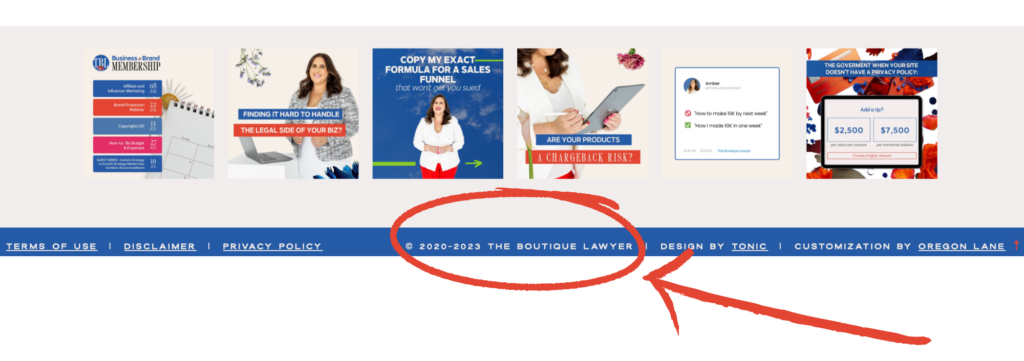YOU DID IT!
You started a business, which means you can now work for yourself and your life is finally stress
free… right?!
If you’re currently a business owner, you probably just laughed out loud. Because while owning
your own business can be fun and exciting, there’s a whole other level of responsibility that
comes along with it.
Aside from having to learn how to successfully market your products or services so you can
make sales (ahem, make money 💸), you also have to make sure your business is covered
from A to Z legally.
And THAT is where business owners often get tripped up.
After all, how are you supposed to know all of the business laws and regulations?! How are you
supposed to know all of the legal stuff that your business needs?!
As a business owner myself, I know it can feel extremely overwhelming, which is why it’s my
mission with The Boutique Lawyer to make it as easy as possible for you!
You *could* spend hours scouring Google for answers OR you could take the guesswork out of
it all and follow along as I deliver almost everything you need to know as a business owner as
far as legalities go.
To get started, there are 6 simple (yet very important) ways you can legally protect your
business starting TODAY!
- Use Clickwrap at Checkout
As you read that, you probably asked yourself, “what the HECK is Clickwrap?” – so let me
explain:
If you’re selling products or services on your website, you need a legal agreement that protects
YOU and your website users.
When it comes to your legal agreements, there are two main ways you can display them on
your website: as clickwrap or as browsewrap.
I go into more detail about the difference between the two in this blog post, but for now I want to
focus on Clickwrap.
A clickwrap legal agreement is when someone has to actively check a box that says “I agree to
the terms…” and this action is typically taken at checkout or when something is added to cart.
When it comes to selling products and services, I always advise business owners to display
your Terms of Purchase and Terms and Conditions as clickwrap (NOT browsewrap) so that
the agreements are more enforceable if any legal action is ever needed.
- Trademark Your Name and Logo
“I didn’t realize I needed to” is the most common reason and biggest mistake that businesses
make when it comes to trademarking their business name at the outset of their brand.
Before you start your business, launch a new product, or even host an event, you MUST make
sure you aren’t infringing on someone else’s trademark.
Otherwise you could be on the receiving end of a trademark infringement lawsuit and actually
face paying back all the money you made operating under someone else’s trademark.
So, how can you avoid paying LOTS of money in the future?
✔️ Run a trademark clearance search when you come up with your business name, product
name, etc.
✔️ Apply for a trademark
✔️ Enforce your brand rights
Does this cost money? Sure! There’s of course a cost to doing legitimate business. But there’s
also a cost to NOT. So, pay the money now to avoid paying more later!
Trademarking is one of the main things that I help business owners with, so if you’re in search of
some hands-on support to help you navigate this process, click here to connect.
- Disclaim Paid Promotions
Did you know that you are LEGALLY required to disclaim your participation in gifted collabs, brand deals, affiliate programs, etc.?
It’s true! Any type of promotion that can lead to you receiving money, requires a disclaimer.
As a business owner, you could potentially face an enforcement action (aka get sued) under the Federal Trade Commission for failing to disclose gifted, paid or sponsored collaborations with brands or influencers.
While I am a huge supporter of affiliate marketing and I encourage you to pursue opportunities like this, make sure you’re backing yourself up legally before doing so!
- Require NDA’s for Employees & Contractors
A Non-Disclosure Agreement (NDA) is a legal contract that establishes a confidential relationship between you and your employees or contractors.
The purpose of an NDA is to protect confidential and proprietary information that may be shared during the course of employment or a business relationship.
Generally, an NDA:
- Helps protect confidential information, such as trade secrets, customers lists, business
- plans and financial information
- Maintains competitive advantage by keeping proprietary information confidential
- Provides legal protection if confidential information is disclosed, which can include monetary damages, injunctions, and other legal remedies
Without requiring an NDA from employees and contractors, you could be putting yourself and your business at risk if or when the professional relationship ends.
- Add a Privacy Policy to Your Website
Did you know that if your website is missing a privacy policy you could potentially be fined up to
$2,500+ per visitor to your site?!
As a lawyer that supports small business owners, my goal is to help you keep more of your
money in YOUR bank account and out of the hands of the government and one mega way to do
that is to make sure your website is legally backed.
A privacy policy is simply a detailed notice that is published on a website, typically found in the
footer, that outlines how that specific website collects, uses and manages a user’s personal
information.
This policy has one job: to inform your website users of what to expect so THEY are protected
and so are YOU!
If you don’t already have a privacy policy on your website, the good news is that this one
is a super simple fix – you can grab the customizable Website Privacy Policy Template
for under $50 and implement this on your website immediately!
- Copyright Your Content
One of the most frustrating things as an online business owner is working hard on your content
just to have someone steal it and use it as their own.
This is of course illegal, but only if your content is copyrighted.
Copyright laws protect the original works of authorship, such as literary, artistic, musical, and
other creative works and includes written content, images, videos, and other forms of media.
To obtain a copyright, the content must be original, meaning that ideas, facts or common
phrases aren’t eligible, and the content must be fixed in a tangible form, such as written or
recorded.
When you create your content, be sure to include your name or your business name as the
author or owner of the work.
While copyright protection is automatic once you create your content, it’s recommended to
register your copyright with the U.S. Copyright Office to ensure full protection!
To really enforce your copyright, it’s recommended that you display a copyright notice on your
content, which includes the © symbol, the year of first publication and your name, just like I’ve
done here on my own website:

Once you’ve taken the steps to copyright your content, if someone infringes on your copyright,
you have the right to take legal action to protect your intellectual property, which usually starts
with a cease-and-desist letter followed by a lawsuit if necessary.
Overall, setting up your business legally is one of the most important things to do early on in
business ownership and doing these 6 things could protect you BIG TIME in the future!
If you want to make sure you’re doing everything right, but are in need of some extra help, I’ve
got you!
To help you operate on a solid legal footing and feel fully confident in your business, The Legalzine has your name written all over it.
This is for creative entrepreneurs looking to secure their brands from the ground up without the staggering cost of hiring an attorney for every move their business makes.
